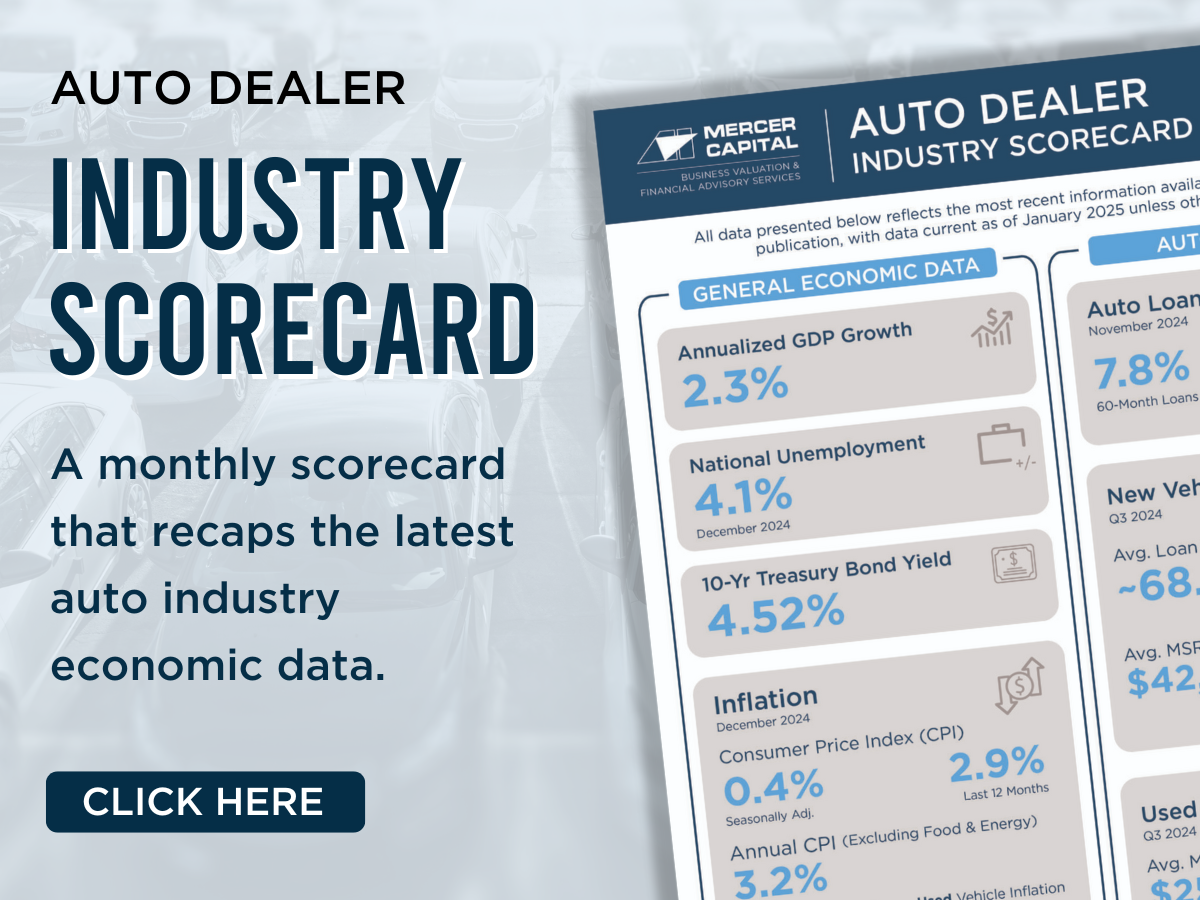Auto Dealership Valuation 101
Valuation of a business can be a complex process requiring certified business valuation and/or forensic accounting professionals. Valuations of automobile dealerships are unique even from the valuation of manufacturing, service and retail companies. Automobile dealership valuations involve the understanding of industry terminology, factory financial statements, and hybrid valuation approaches. For these reasons, it’s important to hire a business valuation expert that specializes in automobile dealership valuation and not just a generalist business valuation appraiser.
Terminology
Unlike most valuations used in the corporate or M&A world, cash flow metrics such as Earnings Before Interest, Taxes and Depreciation (“EBITDA”) are virtually meaningless in automobile dealership valuations. Instead, this industry communicates value in terms of Blue Sky value and Blue Sky multiples. What is Blue Sky value? Any intangible/goodwill value of the automobile dealership over/above the tangible book value of the hard assets is referred to as Blue Sky value. Typically, Blue Sky value is measured as a multiple of pre-tax earnings, referred to as a Blue Sky multiple. Blue Sky multiples vary by franchise/brand and fluctuate year-to-year.
Another unique aspect of automobile dealership valuations is the reported financial statements. Unlike valuations in other industries where the preferred form of financial statements might be audited/compiled or reviewed financial statements, most reputable valuations of automobile dealerships rely upon the financial statements that each dealer reports to the franchise/factory, referred to as Dealer Financial Statements. Why are Dealer Financial statements preferred? Dealer Financial statements provide much more detailed information pertaining directly to the operations of the dealership than any audited financial statement. Valuable information includes the specific operations and profitability of the various departments including, new vehicle, used vehicle, parts and service, and finance and insurance. Each department is unique and has a different impact on the overall success and profitability of the entire dealership. Automobile dealerships are required to report these financial statements to the factory on a monthly basis. However, an experienced business valuation expert knows to request the 13th month dealer financial statements. If a year only has twelve months, then what are the 13th month dealer financial statements? The 13th month dealer financials typically include the year-end tax adjustments such as adjusting the value of new/used vehicles to fair market value by reflecting current depreciation and other adjustments.
Valuation Approaches
Asset-Based Approach
The asset-based approach is a general way of determining a value indication of a business or a business ownership interest using one or more methods based on the value of the assets net of liabilities. Asset-based valuation methods include those methods that seek to adjust the various tangible and intangible assets of an enterprise to fair market value. In automobile dealership valuations, the asset method is utilized to establish the fair market value of the tangible assets. This value is then combined with a Blue Sky “market” approach to conclude the total fair market value of the automobile dealership.
Income Approach
The income approach is a general way of determining a value indication of a business or business ownership interest using one or more methods that convert anticipated economic benefits into a single present amount.
The income approach can be applied in several different ways. Valuation methods under the income approach include those methods that provide for the direct capitalization of earnings estimates, as well as valuation methods calling for the forecasting of future benefits (earnings or cash flows) and then discounting those benefits to the present at an appropriate discount rate. The income approach allows for the consideration of characteristics specific to the subject business, such as its level of risk and its growth prospects relative to the market.
How is the income approach unique to the automobile dealership industry? First, projections are rarely produced or tracked by automobile dealers, so historical capitalization methods are mostly used. Second, most automobile dealerships are dependent on the national economy, and sometimes to a larger degree, their local economies. What impact does this have on the income approach? Business valuation appraisers need to analyze and understand the dependence of each automobile dealership to the national and local economy which usually affects the seasonality/cyclicality of operations and profitability. Once again the automobile dealership is unique in that it can experience seasonal/cyclical fluctuation in a given year, or more importantly, it fluctuates over a longer period of more like five to seven years.
Market Approach
The market approach is a general way of determining the value indication of a business or business ownership interest by using one or more methods that compare the subject to similar businesses, business ownership interests, securities, or intangible assets that have been sold.
Market methods include a variety of methods that compare the subject with transactions involving similar investments, including publicly traded guideline companies and sales involving controlling interests in public or private guideline companies. Consideration of prior transactions in interests of a valuation subject is also a method under the market approach.
In the automobile dealership industry, traditional market approaches are basically meaningless. While there are a few publicly traded companies in the industry, they are large consolidators and own numerous dealership locations of many franchises in many geographic areas. Private transactions exist, but generally not in a large enough sample size of the particular franchise of the subject interest to provide meaningful comparisons.
So how does a business valuation expert utilize the market approach in the valuation of automobile dealerships? The answer is a hybrid method utilizing published Blue Sky multiples from transactions of various franchise dealership locations. Two primary national sources, Haig Partners and Kerrigan Advisors, publish Blue Sky multiples quarterly by franchise. As discussed earlier, these multiples are applied to pre-tax earnings and indicate the Blue Sky or intangible value of the dealership. When combined with the tangible value of the hard assets determined under the Asset Approach, an experienced business valuation expert is able to conclude a total value for the dealership using this hybrid approach and communicate that result as a multiple of Blue Sky that will be understood and accepted in this industry.
Conclusions
The valuation of automobile dealerships can be more complex than other valuations due to their unique financial statements, varying cost structures and profitability of departments, different terminology, and hybrid valuation methods. Hiring a business valuation expert that specializes in this industry rather than a generalist business valuation appraiser can make all the difference in providing a reasonable valuation conclusion.
 Auto Dealer Valuation Insights
Auto Dealer Valuation Insights 








